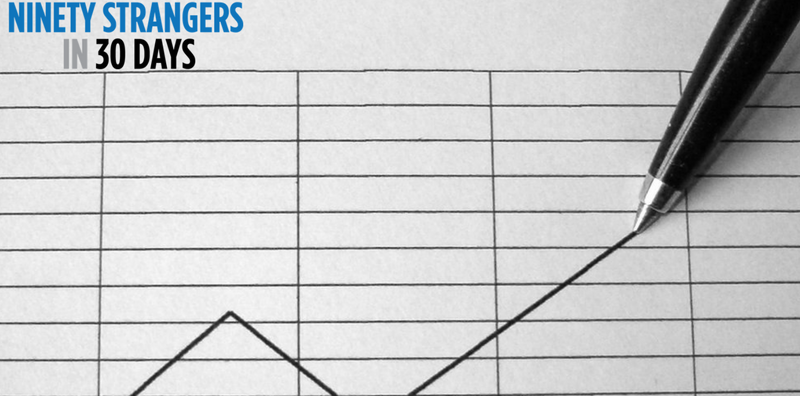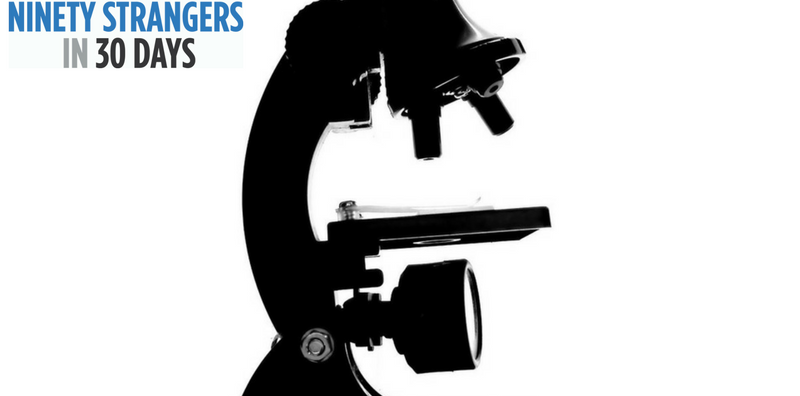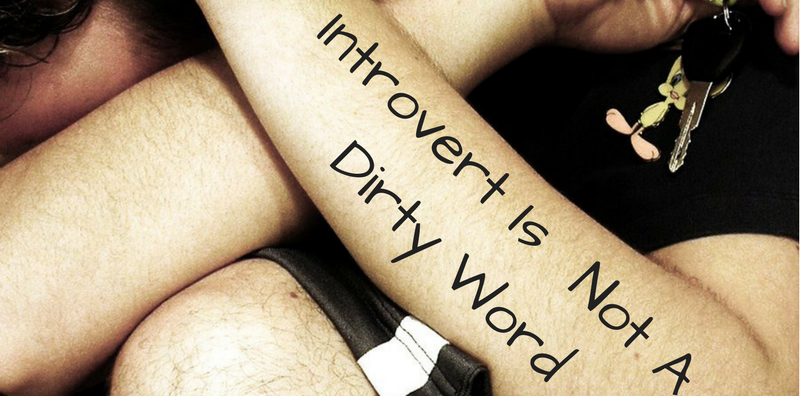
Project Data and Review
This post was from a 30-day social experiment I did as a way to try and improve my social skills. Also check out the project hub page, post-project recap, five biggest takeaways, frequently asked questions, the original reddit post, and the subsequent TEDx Talk.
Like a blur, June came and went, and at the end of the month I had chatted with (or attempted to) 118 strangers.
View the final data sheet (PDF).
(Yes, there are one or two on there that probably didn’t meet the criteria of my initial rules; in particular, an instance where I was straight up ignored by someone in Target. I thought it was important to include simply because that can and will happen on occasion, and I found it hilarious)
And in lieu of spending way too many hours in MS Paint, I decided to nix the visual map. I think the numbers below paint a good enough picture.
Data Breakdown
By age:
Teens: 6 (5%)
20s: 63 (53%)
30s: 24 (20%)
40s: 13 (11%)
50s: 10 (8%)
60s: 2 (2%)
By gender:
F: 75 (64%)
M: 43 (36%)
By demographic:
FTeens: 6 (5%)
F20s: 41 (35%)
F30s: 14 (12%)
F40s: 9 (8%)
F50s: 3 (3%)
F60s: 2 (2%)
M20s: 22 (19%)
M30s: 10 (8%)
M40s: 4 (3%)
M50s: 7 (6%)
By location:
Airport: 2 (2%)
Apartment Complex: 5 (4%)
Bar: 17 (14%)
Baseball Game: 1 (<1%)
Coffee Shop: 4 (3%)
Concert: 4 (3%)
Conference: 2 (2%)
CrossFit: 15 (13%)
Grocery: 5 (4%)
Library: 1 (<1%)
Liquor Store: 1 (<1%)
Mall: 5 (4%)
Networking Event: 8 (7%)
Pageant Judging: 3 (3%)
Party: 10 (8%)
Plane: 3 (3%)
Restaurant: 8 (7%)
Retail Store: 3 (3%)
Swing Dancing: 10 (8%)
Toastmasters: 2 (2%)
Work Trip: 9 (8%)
Did we exchange names?
Yes: 78 (66%)
No: 40 (34%)
—
The most surprising thing about this challenge was how hard it wasn’t–I didn’t really need to change my daily habits that much to put myself in the way of strangers to talk to.
When I was thinking up the experiment, I had envisioned having to run out to bars on weeknights to talk to whoever was around out of desperation to meet my quota. This rarely happened and made me realize just how many opportunities throughout the course of a ‘normal’ day there are to meet new people.
That said, there were still nights that the project felt like the bane of my existence and when I just wanted to stay home and do anything besides forcing conversation with random strangers. However, this apathy often put me in a carefree state, which lead to some fun and interesting conversations.
Not seen on the data sheet is all of the quality conversations I also had with people that technically didn’t ‘count’ by my rules, such as waitresses, bartenders, and hotel staff.
And while “talk to everyone” is a creed I have tried to live by for a while now, my thought process and observations about it were completely different since I was now doing it with a more experimental and monitored mindset.
More FAQs/In Review
Was it hard at all?
As in just doing the act of talking to three strangers a day? No. Not really. Harder for me was not relying on the same lazy opening dialogue with every single person, trying to meet people in a variety of places, and trying to have genuine conversations, and not just short, meaningless exchanges for the sole purpose of checking off one of my boxes for the day.
The hardest days were when it got to be 8PM and I still needed to talk to two or three people. Again, this still happened way less than I had anticipated and just goes to show how many opportunities there are to meet new people throughout the day. In particular, the first conversations on these types of days were the hardest thing about the whole project.
With the anxiety that comes from starting conversations gone, having ones of greater value is what I started to care about most and what became my biggest challenge toward the end of the month.
What was the most interesting thing I observed?
One idea I was really curious about beforehand was that of micromomentum versus macromomentum. Micro being social momentum gained during an individual day or a series of days, and macro being the bigger picture and just an overall, real change in myself; a habit, essentially.
Micro was something I had observed to be very, very real before and it’s obvious to me now that macro is too. . .by the end of the month any remaining anxiety I had about talking to someone out of the blue or trying to think of the perfect thing to say was gone.
Did it make me more social?
I think so. I became a lot (a lot) quicker to pull the proverbial trigger in speaking to people around me, because the alternative to not acting fast usually meant, like I mentioned, having to go to a bar or wander around a retail store looking for someone to talk to at 10pm on a weeknight.
One of the biggest differences was in places where I knew I would probably see that person again, like at my gym. In the past, it had always been easy to not introduce myself to someone new because I knew I’d be seeing them plenty from then on out, but during the experiment it felt good to be that super-friendly and welcoming person. It made me think back to how good it felt when I was new and regular members would come introduce themselves and talk to me.
‘More social’ is of course relative and ultimately hard to quantify, but when the reaction time in starting conversations becomes shorter, things rarely get awkward and rapport is established much quicker with a greater percentage of people.
What was my strategy? What kind of things did I open with?
I didn’t tally the data on this, but it appears that the overwhelming majority of my ‘openers’ were just plain old introductions such as ‘Hi, I’m Andrew.’ These of course were mostly used in ‘familiar’ settings such as small parties, the gym, and the like. More often than not, that’s all it took to start at least a halfway-decent conversation.
Other favorite methods included observational openers. This means what it sounds like- just throwing out a comment to someone about something going on around us, about something they are wearing, and so on. I am a big fan of starting conversations this way simply because it gives the conversation a direction at the beginning that isn’t an ‘interview’ (e.g., where are you from, what do you do, blah blah) and is something both of you can relate to immediately since you are experiencing that moment together.
Situational starters were also used, as in just asking a question or making a (dumb) comment pertaining to the event we were both at (e.g., “Are you guys young and/or professionals?” at a networking event).
What was a downside of the project?
One thing I started to observe towards the end was that a few times I was expelling the chance of developing existing relationships further in lieu of pursuing a short, more ‘shallow’ exchange with someone I hadn’t met yet merely for the sake of the project.
But fortunately, most of the people that I made a good connection with I will see again.
What was surprising?
I am a big advocate of Meetup.com for expanding one’s social circle and in the past I have met some pretty cool people using it in all three states I have lived in.
Heading into this, I was certain that I would have to rely strongly on Meetup, but actually ended up never having to use it (granted the ones here rarely work with my weeknight schedule).
Also surprising was just how appallingly bad I am at remembering names. Something I will definitely be seeking out ways to improve upon.
Did you make any new friends?
This is more of a question for a few months down the line, as, more than anything else, friendships take time and consistent effort. However, I do feel that I had some quality conversations that could be the basis future friendships.
In particular, on the last night of the project I was coming home from swing dancing and came across one my neighbors who was smoking outside. I decided to sit down and talk with her while she was finishing her cigarette and we ended up chatting for an hour and a half.
I also exchanged numbers with a few other people and could see myself hanging out with them at some point.
When I became ‘un-shy’ or whatever one big concept I had to get through my head was that I couldn’t just become everyone’s best friend immediately (or ever). Friendships= chemistry + consistent interaction over time.
Would I recommend someone who wishes they were more social to try this challenge?
Mostly yes!
Overall, I think forcing yourself to talk to strangers is an expressway for developing yourself into a better person.
It’s one of the quickest ways to gain confidence in yourself, and makes you realize that you aren’t on the ‘outside looking in’ and that everyone else doesn’t posses some sort of ‘social secret’ that you aren’t being let in on. As I have learned recently, a lot of people, many who I never would have suspected, fear being in social situations where they don’t know anyone and feel that their social skills are lacking.
However, unless you are lucky enough to work from home and can sometimes get through days without ever leaving your own walls, I don’t know if going out and forcing conversation with random people in grocery stores is completely necessary to become better at socializing and expanding your social circle.
Again, cashiers are a gold mine for small-talk practice, and probably what got me to finally bust out of my shell a few years ago. They have to be nice to you, and if things are awkward you probably won’t ever see them again. And as a former employee in the service sector, I appreciated few things more than a customer that would break me out my mindless routine and treat me like an actual person.
The beauty about this project is that it can be scaled and modified to hit on whatever someone thinks their particular weaknesses might be. For instance, if I were to have done this in 2011, talking to just one random person a day would have been a major feat for me. If I had had the idea in college I probably would have made the qualifier be people in my classes.
Did you experience any other kind of benefits?
This has been written about for ages, but when you talk to everyone, your world just opens up. You discover and learn things about people, places, and yourself that no self-development blog, travel guide, or amount of introspection can ever teach you.
For example, a person I met at a party enlightened me about a local music blogger that hosts travelling bands (some reasonably big names, too) who will play a free show in exchange for a place to stay. These shows (at least the one I have gone to so far) are around 20-25 people and are easily one of the coolest secrets I have discovered in this city. Would I have ever found out about it if I didn’t consistently talk to whoever is around me? Highly unlikely.
I think it’s easy to assume in our digital-age that anything worth knowing can be found on the internet of our own accord, but other people hold secrets that can’t be discovered anywhere else.





